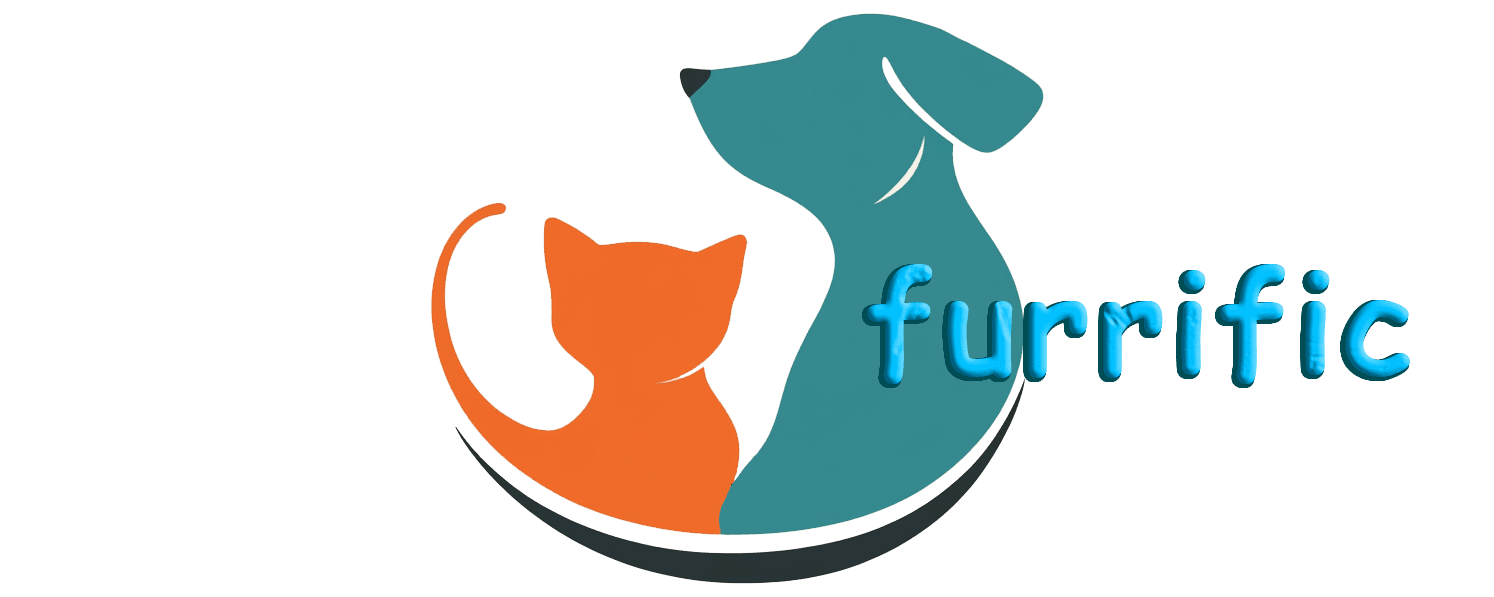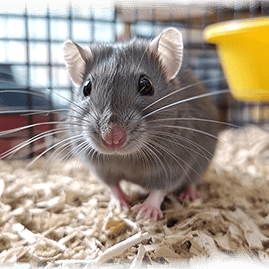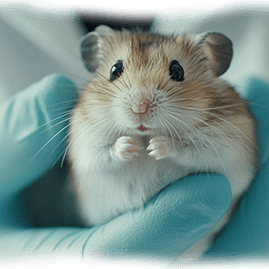Guinea Pig Health: A Comprehensive Guide to Keeping Your Pet Healthy
Guinea pigs are adorable, social pets that bring joy to many households. However, like any pet, they require proper care to stay healthy and happy. While guinea pigs are generally hardy animals, they are prone to certain health issues that owners should be aware of. Early detection and preventive care are key to ensuring your guinea pig lives a long, healthy life.
In this guide, we’ll cover common health problems in guinea pigs, preventive care tips, and advice on how to keep your guinea pig in top shape.
Common Guinea Pig Health Issues
Guinea pigs can face a variety of health challenges. Here are some of the most common health issues, along with tips on how to prevent or treat them.
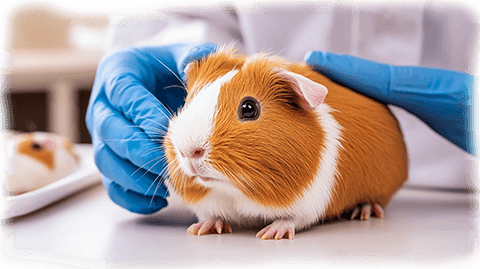
Respiratory Infections
Guinea pigs are susceptible to respiratory infections, especially if they are exposed to drafts, high humidity, or damp bedding. Early detection is crucial because respiratory infections can quickly become serious if left untreated.
Symptoms to Watch For
- Sneezing or coughing
- Labored or rapid breathing
- Discharge from the nose or eyes
- Lethargy or lack of appetite
Prevention Tips
- Keep your guinea pig’s enclosure clean and dry at all times.
- Ensure proper ventilation in the room where the cage is kept, but avoid direct drafts.
- Use high-quality bedding (Amazon affiliate link) such as paper-based bedding or aspen shavings, and avoid pine or cedar shavings, which can irritate your guinea pig’s respiratory system.
- Maintain a stable temperature between 65-75°F (18-24°C), as sudden temperature changes can stress your guinea pig.
Dental Issues
Guinea pigs’ teeth grow continuously throughout their lives, which can sometimes lead to dental problems. Overgrown teeth can make it difficult for your guinea pig to eat, leading to weight loss and malnutrition.
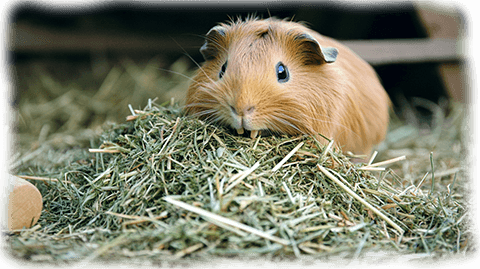
Symptoms to Watch For
- Drooling or wet fur around the mouth
- Difficulty chewing or dropping food
- Weight loss
- Swollen or abscessed gums
Prevention Tips
- Provide plenty of fibrous foods like hay, which helps to naturally wear down their teeth. Timothy hay should make up the majority of your guinea pig’s diet. (Amazon affiliate link)
- Offer chew toys and safe wooden blocks for them to gnaw on.
- Monitor their weight regularly, and if you notice weight loss, have their teeth checked by a vet.
Scurvy (Vitamin C Deficiency)
Guinea pigs, like humans, cannot produce their own vitamin C, making it essential to provide them with a diet rich in this vitamin. A lack of vitamin C can lead to scurvy, a condition that weakens their immune system and causes a range of health problems.
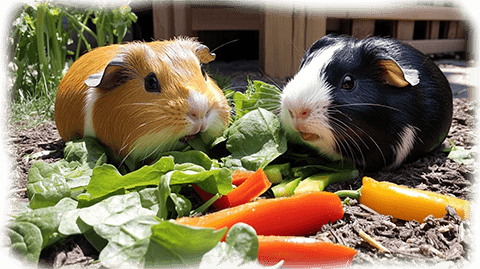
Symptoms to Watch For
- Lethargy or weakness
- Swollen or painful joints
- Rough coat or hair loss
- Loss of appetite
Prevention Tips
- Provide fresh vegetables high in vitamin C daily, such as bell peppers, kale, parsley, and spinach.
- Supplement their diet with vitamin C-enriched pellets or vitamin C drops (Amazon affiliate link) in their water, but avoid giving too much, as this can upset their stomach.
- Be mindful of how long vegetables are left in their cage, as vitamin C degrades quickly once cut.
Skin Conditions
Guinea pigs can develop various skin problems, including mites, lice, fungal infections, and dermatitis. Mites and lice can cause intense itching, while fungal infections like ringworm can lead to hair loss and scaly patches on their skin.
Symptoms to Watch For
- Excessive scratching or biting at their skin
- Hair loss or bald patches
- Scabs or redness on the skin
- Flaky or scaly patches
Prevention Tips
- Keep their cage clean and free of waste, which can harbor parasites.
- Regularly inspect your guinea pig’s skin and fur for signs of mites or lice.
- If your guinea pig shows symptoms of a skin issue, consult a vet. They may prescribe topical treatments or antifungal medication.
Digestive Problems
Guinea pigs have sensitive digestive systems, and any disruption in their diet or feeding schedule can lead to issues like diarrhea, bloating, or constipation.
Symptoms to Watch For
- Diarrhea or loose stools
- Lack of appetite
- Abdominal discomfort or bloating
- Straining during bowel movements
Prevention Tips
- Ensure your guinea pig has constant access to fresh hay, which supports healthy digestion.
- Avoid sudden changes in diet, especially new fruits or vegetables that may cause gastrointestinal upset.
- Provide fresh, clean water at all times, and change it daily. (Amazon affiliate link)
- If diarrhea or bloating persists, seek veterinary advice, as these symptoms could indicate a serious condition.
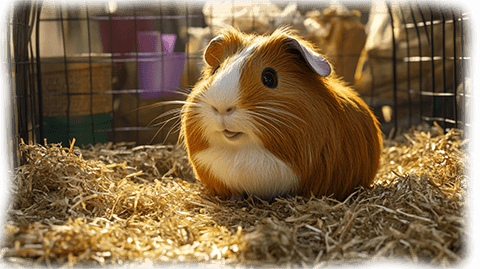
Guinea Pig Health Maintenance Tips
In addition to monitoring for common health problems, there are several proactive steps you can take to maintain your guinea pig’s overall health.
Proper Nutrition
- Hay should make up the majority of your guinea pig’s diet to support dental health and digestion.
- Fresh Vegetables like leafy greens, bell peppers, and carrots should be offered daily to provide essential vitamins, especially vitamin C.
- Pellets: Choose a high-quality guinea pig pellet that includes added vitamin C.
Regular Grooming
- Brushing – Long-haired guinea pigs may require regular brushing to prevent matting. Use a soft brush to gently remove loose hair.
- Nail Trimming – Guinea pigs’ nails grow continuously and should be trimmed every 4-6 weeks. Be careful not to cut too close to the quick, which can cause bleeding.
- Bathing – Guinea pigs do not require frequent baths, but if they get especially dirty, use a small animal-safe shampoo and ensure they are dried completely afterward.
Cage Cleanliness
- Bedding – Use absorbent, guinea pig-safe bedding (Amazon affiliate link) and change it regularly to prevent odors, ammonia buildup, and the spread of disease.
- Spot Cleaning – Perform daily spot cleaning to remove waste and food debris.
- Complete Cage Cleaning – Every week, remove all bedding, disinfect the cage, and replace it with fresh, clean bedding.
Exercise and Enrichment
- Cage Size – Ensure your guinea pig’s cage is large enough for them to move around freely. The recommended size is at least 7.5 square feet for one or two guinea pigs.
- Toys and Tunnels – Provide toys, tunnels, and hideouts to keep your guinea pig mentally stimulated and encourage natural foraging behaviors.
- Out-of-Cage Time – Allow your guinea pig supervised playtime outside of their cage in a safe, enclosed area to give them space to explore and exercise.
When to See a Vet
If you notice any of the following symptoms, it’s important to seek veterinary care immediately:
- Loss of appetite or weight loss
- Lethargy or weakness
- Labored breathing
- Diarrhea, bloating, or constipation
- Excessive scratching or hair loss
- Any lumps, swelling, or unusual growths
Early detection and timely treatment are key to preventing more serious health issues in guinea pigs. Always consult a vet if you have any concerns about your pet’s health.
Conclusion
Maintaining your guinea pig’s health requires a combination of proper diet, cleanliness, and regular monitoring for any signs of illness. By providing a stable, enriched environment and following the tips in this guide, you can ensure your guinea pig enjoys a long and healthy life. Remember to keep an eye out for common health issues and schedule regular vet visits to address any concerns early.
Further reading: Guinea Pigs: The Guinea Pig Care Guide | Complete Beginners Guide Including Diet, Grooming, Cage Setup and More | How to Look After Guinea Pigs for Children and Adults by Louisa Tarver. (Amazon affiliate link)
Affiliate Disclosure
This post may contain affiliate links, which means I earn from purchases made through links. Please see the privacy policy page for more details.
